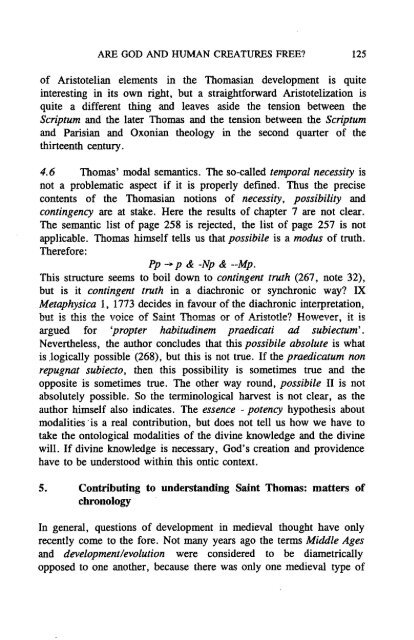Jaarboek Thomas Instituut 1997 - Thomas Instituut te Utrecht
Jaarboek Thomas Instituut 1997 - Thomas Instituut te Utrecht
Jaarboek Thomas Instituut 1997 - Thomas Instituut te Utrecht
Create successful ePaper yourself
Turn your PDF publications into a flip-book with our unique Google optimized e-Paper software.
ARE GOD AND HUMAN CREATURES FREE? 125<br />
of Aristo<strong>te</strong>lian elements in the <strong>Thomas</strong>ian development is qui<strong>te</strong><br />
in<strong>te</strong>resting in its own right, but a straightforward Aristo<strong>te</strong>lization is<br />
qui<strong>te</strong> a different thing and leaves aside the <strong>te</strong>nsion between the<br />
Scriptum and the la<strong>te</strong>r <strong>Thomas</strong> and the <strong>te</strong>nsion between the Scriptum<br />
and Parisian and Oxonian theology in the second quar<strong>te</strong>r of the<br />
thir<strong>te</strong>enth century.<br />
4.6 <strong>Thomas</strong>' modal semantics. The so-called <strong>te</strong>mporal necessity is<br />
not a problematic aspect if it is properly defined. Thus the precise<br />
con<strong>te</strong>nts of the <strong>Thomas</strong>ian notions of necessity, possibility and<br />
contingency are at stake. Here the results of chap<strong>te</strong>r 7 are not clear.<br />
The semantic list of page 258 is rejec<strong>te</strong>d, the list of page 257 is not<br />
applicable. <strong>Thomas</strong> himself <strong>te</strong>lls us that possibile is a modus of truth.<br />
Therefore:<br />
Pp=+p & -Np & --Mp.<br />
This structure seems to boil down to contingent truth (267, no<strong>te</strong> 32),<br />
but is it contingent truth in a diachronic or synchronic way? IX<br />
Metaphysica 1, 1773 decides in favour of the diachronic in<strong>te</strong>rpretation,<br />
but is this the voice of Saint <strong>Thomas</strong> or of Aristotle? However, it is<br />
argued for 'prop<strong>te</strong>r habitudinem praedicati ad subiectum'.<br />
Nevertheless, the author concludes that this possibile absolu<strong>te</strong> is what<br />
is Iogically possible (268), but this is not true. If the praedicatum non<br />
repugnat subiecto, then this possibility is sometimes true and the<br />
opposi<strong>te</strong> is sometimes true. The other way round, possibile II is not<br />
absolu<strong>te</strong>ly possible. So the <strong>te</strong>rminological harvest is not clear, as the<br />
author himself also indica<strong>te</strong>s. The essence - po<strong>te</strong>ncy hypothesis about<br />
modalities' is a real contribution, but does not <strong>te</strong>ll us how we have to<br />
take the ontological modalities of the divine knowledge and the divine<br />
will. If divine knowledge is necessary, God's creation and providence<br />
have to be understood within this ontic con<strong>te</strong>xt.<br />
5. Contributing to understanding Saint <strong>Thomas</strong>: mat<strong>te</strong>rs of<br />
chronology<br />
In general, questions of development in medieval thought have only<br />
recently come to the fore. Not many years ago the <strong>te</strong>rms Middle Ages<br />
and development/evolution were considered to be diametrically<br />
opposed to one another, because there was only one medieval type of








